Playful Healing Center



| Child psychotherapy |
|
 Play Therapy
Play Therapy
What is Play Therapy?
... toys are the child's words!
Initially developed in the turn of the 20th century, today play therapy refers to a large number of treatment methods, all applying the therapeutic benefits of play. Play therapy differs from regular play in that the therapist helps children to address and resolve their own problems. Play therapy builds on the natural way that children learn about themselves and their relationships in the world around them (Axline, 1947; Carmichael, 2006; Landreth, 2002). Through play therapy, children learn to communicate with others, express feelings, modify behavior, develop problem-solving skills, and learn a variety of ways of relating to others. Play provides a safe psychological distance from their problems and allows expression of thoughts and feelings appropriate to their development.
APT (Association for Play Therapy) defines play therapy as "the systematic use of a theoretical model to establish an interpersonal process wherein trained play therapists use the therapeutic powers of play to help clients prevent or resolve psychosocial difficulties and achieve optimal growth and development."
How Does Play Therapy Work?
Children are referred for play therapy to resolve their problems (Carmichael; 2006; Schaefer, 1993). Often, children have used up their own problem solving tools, and they misbehave, may act out at home, with friends, and at school (Landreth, 2002). Play therapy allows trained mental health practitioners who specialize in play therapy, to assess and understand children's play. Further, play therapy is utilized to help children cope with difficult emotions and find solutions to problems (Moustakas, 1997; Reddy, Files-Hall & Schaefer, 2005). By confronting problems in the clinical Play Therapy setting, children find healthier solutions. Play therapy allows children to change the way they think about, feel toward, and resolve their concerns (Kaugars & Russ, 2001). Even the most troubling problems can be confronted in play therapy and lasting resolutions can be discovered, rehearsed, mastered and adapted into lifelong strategies (Russ, 2004).
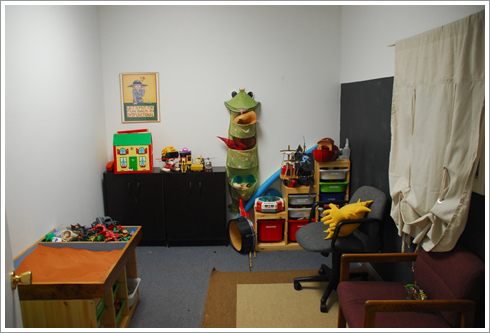
Inside of Play therapy room
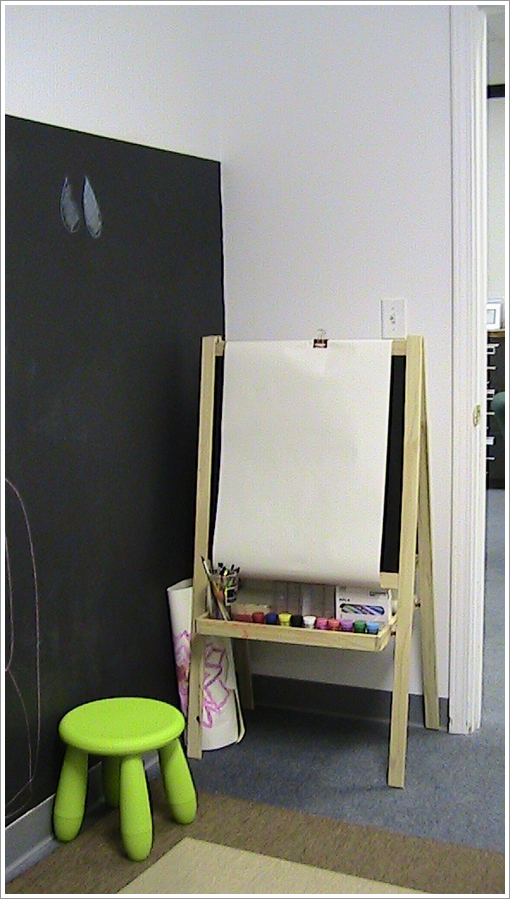
Art Area
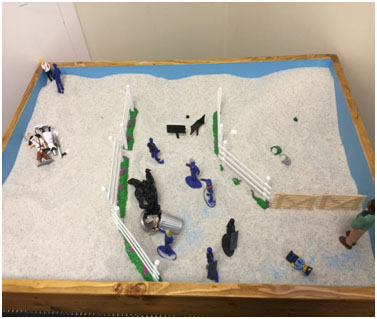
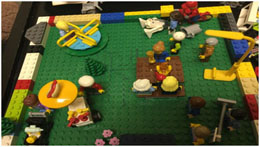
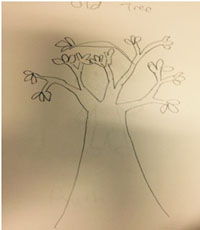
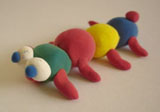
How Will Play Therapy Benefit A Child?
Play therapy is implemented as a treatment of choice in mental health, school, agency, developmental, hospital, residential, and recreational settings, with clients of all ages (Carmichael, 2006; Reddy, Files-Hall & Schaefer, 2005).
Play therapy treatment plans have been utilized as the primary intervention or as an adjunctive therapy for multiple mental health conditions and concerns (Gil & Drewes, 2004; Landreth, Sweeney, Ray, Homeyer & Glover, 2005), e.g. anger management, grief and loss, divorce and family dissolution, and crisis and trauma, and for modification of behavioral disorders (Landreth, 2002), e.g. anxiety, depression, attention deficit hyperactivity (ADHD), autism or pervasive developmental, academic and social developmental, physical and learning disabilities, and conduct disorders (Bratton, Ray & Rhine, 2005).
Research supports the effectiveness of play therapy with children experiencing a wide variety of social, emotional, behavioral, and learning problems, including: children whose problems are related to life stressors, such as divorce, death, relocation, hospitalization, chronic illness, assimilate stressful experiences, physical and sexual abuse, domestic violence, and natural disasters (Reddy, Files-Hall & Schaefer, 2005). Play therapy helps children:
- Become more responsible for behaviors and develop more successful strategies.
- Develop new and creative solutions to problems.
- Develop respect and acceptance of self and others.
- Learn to experience and express emotion.
- Cultivate empathy and respect for thoughts and feelings of others.
- Learn new social skills and relational skills with family.
- Develop self-efficacy and thus a better assuredness about their abilities.
from "www. A4pt.org" – about playtherapy : play therapy makes a difference
Disorders
Although everyone benefits, play therapy is especially appropriate for children ages 3 through 12 years old (Carmichael, 2006; Gil, 1991; Landreth; 2002; Schaefer, 1993). Teenagers and adults have also benefited from play techniques and recreational processes. To that end, use of play therapy with adults within mental health, agency, and other healthcare contexts is increasing (Pedro-Carroll & Reddy, 2005; Schaefer, 2003). In recent years, play therapy interventions have also been applied to infants and toddlers.
- Anxiety Disorders
- Depression Disorder
- Attention Deficit Hyperactivity Disorder (ADHD)
- Autism or Pervasive Developmental Disorder
- Social Developmental Issues
- Physical/Learning Disabilities
- Conduct Disorder
.gif)